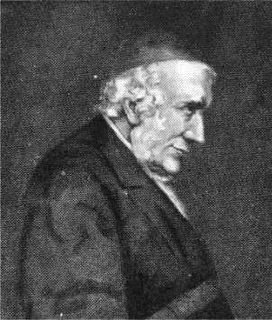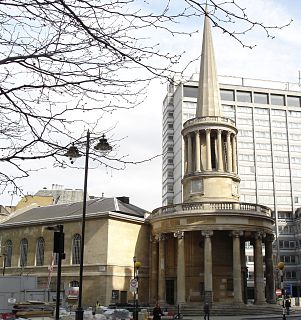
Anglicanism is a Western Christian tradition that has developed from the practices, liturgy, and identity of the Church of England following the English Reformation, in the context of the Protestant Reformation in Europe. It is one of the largest branches of Christianity, with around 110 million adherents worldwide as of 2001.

Anglo-Catholicism, Anglican Catholicism, or Catholic Anglicanism comprises people, beliefs and practices within Anglicanism that emphasise the Catholic heritage and identity of the various Anglican churches.

The Oxford Movement was a movement of High Church members of the Church of England which eventually developed into Anglo-Catholicism. The movement, whose original devotees were mostly associated with the University of Oxford, argued for the reinstatement of some older Christian traditions of faith and their inclusion into Anglican liturgy and theology. They thought of Anglicanism as one of three branches of the "one, holy, catholic, and apostolic" Christian church. By the 1840s many participants decided that the Anglican Church lacked grace, and converted to Roman Catholicism.

The words Popery and Papism are mainly historical pejorative words in the English language for Roman Catholicism, once frequently used by Protestants and Eastern Orthodox Christians to label their Roman Catholic opponents, who differed from them in accepting the authority of the Pope over the Christian Church. The words were popularised during the English Reformation (1532–1559), when the Church of England broke away from the Roman Catholic Church and divisions emerged between those who rejected Papal authority and those who continued to follow Rome. The words are recognised as pejorative; they have been in widespread use in Protestant writings until the mid-nineteenth century, including use in some laws that remain in force in the United Kingdom.

The Continuing Anglican movement, also known as the Anglican Continuum, encompasses a number of Christian churches, principally based in North America, which have an Anglican identity and tradition but are not part of the Anglican Communion. These churches generally believe that traditional forms of Anglican faith and worship have been unacceptably revised or abandoned within some churches of the Anglican Communion but that they, the Continuing Anglicans, are preserving or "continuing" both Anglican lines of apostolic succession and historic Anglican belief and practice.

The Diocese of Sydney is a diocese in Sydney, within the Province of New South Wales of the Anglican Church of Australia. The majority of the diocese is evangelical and low church in tradition.

Geoffrey Francis Fisher, Baron Fisher of Lambeth, was an English Anglican priest, and 99th Archbishop of Canterbury, serving from 1945 to 1961.

The term high church refers to beliefs and practices of Christian ecclesiology, liturgy, and theology that emphasize formality and resistance to modernisation. Although used in connection with various Christian traditions, the term originated in and has been principally associated with the Anglican tradition, where it describes churches using a number of ritual practices associated in the popular mind with Roman Catholicism and Eastern Orthodoxy. The opposite tradition is low church. Contemporary media discussing Anglican churches erroneously prefer the terms evangelical to low church and Anglo-Catholic to high church, even though their meanings do not exactly correspond. Other contemporary denominations that contain high church wings include some Lutheran, Presbyterian, and Methodist churches.

Broad church is latitudinarian churchmanship in the Church of England in particular and Anglicanism in general. The term is often used for secular political organisations, meaning that they encompass a broad range of opinion.

In Anglican Christianity, the "low church" wing of one of the Anglican churches includes those who give relatively little emphasis to ritual, sacraments, and sometimes the authority of clergy. The term is most often used in a liturgical context. "Low church", in a contemporary Anglican context, denotes a Protestant emphasis, and "high church" denotes an emphasis on ritual, often as Anglo-Catholicism.

Ritualism, in the history of Christianity, refers to an emphasis on the rituals and liturgical ceremony of the church, in particular of Holy Communion.

Churchmanship is a way of talking about and labelling different tendencies, parties, or schools of thought within the Church of England and the sister churches of the Anglican Communion.

The term Evangelical Catholic is used in Lutheranism, alongside the term Augsburg Catholic, with those calling themselves Evangelical Catholic Lutherans or Lutherans of Evangelical Catholic churchmanship stressing the catholicity of historic Lutheranism in liturgy, beliefs, practices, and doctrines. Evangelical Catholics teach that Lutheranism at its core "is deeply and fundamentally catholic". The majority of Evangelical Catholic Lutheran clergy and parishes are members of mainstream Lutheran denominations.

High church Lutheranism is a movement that began in 20th-century Europe and emphasizes worship practices and doctrines that are similar to those found within both Roman Catholicism and Eastern Orthodoxy and the Anglo-Catholic wing of Anglicanism. In the more general usage of the term, it describes the general high church characteristics of Lutheranism in the Nordic countries such as Sweden, Finland, Estonia and Latvia. The mentioned countries, once a part of the Swedish Empire, have more markedly preserved Catholic traditions.

Catholicity is a concept pertaining to beliefs and practices widely accepted across numerous Christian denominations, most notably those that describe themselves as Catholic in accordance with the Four Marks of the Church, as expressed in the Nicene Creed of the First Council of Constantinople in 381: "[I believe] in one, holy, catholic, and apostolic Church."
Anglican doctrine is the body of Christian teachings used to guide the religious and moral practices of Anglicans.
Cyril Easthaugh was a British Anglican bishop in the 20th Century. He was Bishop of Kensington from 1949 to 1961 and Bishop of Peterborough from 1961 to 1972.
Modern Church is a charitable society promoting liberal Christian theology. It defends liberal positions on a wide range of issues including gender, sexuality, interfaith relations, religion and science, and biblical scholarship. In church affairs it supports the role of laity and women ministers. Members receive the journal Modern Believing and the newsletter Signs of the Times. A substantial account of its theology is Paul Badham’s The Contemporary Challenge of Modernist Theology. From 2011-2013 it published a series of short books introducing some of its themes. It has a large website. There is a regular annual conference. The theological principles behind its liberalism are that

Wilfred Lawrence Knox (1886–1950) was an English Anglican priest and theologian, one of four brothers who distinguished themselves. After leaving Oxford with a first-class honours degree in classics, Knox soon began working with the poor of London's East End, and then studied for the priesthood. After brief parish work, he was warden of the Oratory of the Good Shepherd from 1924 to 1940, and chaplain and fellow of Pembroke College, Cambridge. He approached his New Testament studies as a Hellenist, and wrote several books on Paul the Apostle and other aspects of ecclesiastical history from that angle. He also wrote books explaining Anglo-Catholicism and the Christian way of life.

Evangelical Anglicanism or evangelical Episcopalianism is a tradition or church party within Anglicanism that shares affinity with broader evangelicalism. Evangelical Anglicans share with other evangelicals the attributes of "conversionism, activism, biblicism and crucicentrism" identified by historian David Bebbington as central to evangelical identity. The emergence of evangelical churchmanship can be traced back to the First Great Awakening in America and the Evangelical Revival in Britain in the 18th century. In the 20th century, prominent figures have included John Stott and J. I. Packer.











